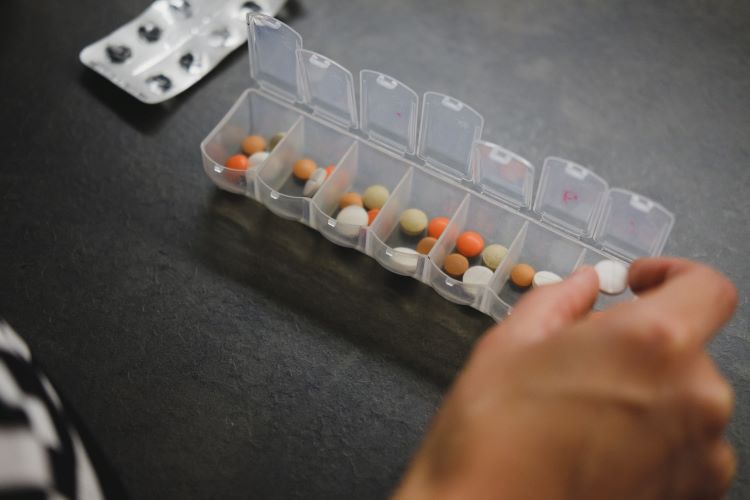Medications for Alcohol Withdrawal
Quick links for Medications for Alcohol Withdrawal
- What causes alcohol withdrawal symptoms?
- What are the symptoms of alcohol withdrawal?
- Am I at risk of severe alcohol withdrawal symptoms?
- Medications used for alcohol withdrawal
- What are the stages of alcohol withdrawal?
- References for medications for alcohol withdrawal
The process of alcohol withdrawal can be unpleasant and difficult to deal with. [1]
In severe cases, it can even be life-threatening.
Thankfully, there are a number of medications that have been approved for use in treating the symptoms of alcohol withdrawal.
These medications are commonly prescribed at alcohol rehab facilities.
This article will explore in detail the causes of alcohol withdrawal syndrome, any potential risk factors, and the various medications that can help to ease or alleviate the more uncomfortable side effects of detoxification.
What causes alcohol withdrawal symptoms?

Man suffering from alcohol withdrawal
Alcohol withdrawal symptoms can occur when an individual who is physically and/or psychologically dependent on alcohol attempts to significantly reduce or entirely stop their alcohol intake.
The body needs to work much harder to function when alcohol is present due to the depressive effect this substance has on the central nervous system, changing the way the brain and body works.
If an individual is regularly consuming high amounts of alcohol, the body will adapt to the initial chemical imbalance and will find a way to function despite a high amount of alcohol slowing down the system.
This is usually achieved by maintaining a hyper-alert state in order to counter the depressive effects of alcohol, keeping the brain alert, and continuing normal bodily functions.
When the alcohol is reduced or taken away entirely the body remains in this hyper-alert state for some time, often resulting in a number of alcohol withdrawal symptoms.
Alcohol withdrawal symptoms can be more or less severe depending on the length of the addiction and the amount of alcohol consumed on a regular basis. There are also certain risk factors that may determine the severity of the symptoms, which will be discussed further on.
What are the symptoms of alcohol withdrawal?

Person holding their head feeling the effects of alcohol withdrawal
Many people will experience one or more of the most common alcohol withdrawal symptoms when beginning the detoxification process.
While these symptoms are not usually life-threatening, anyone attempting to withdraw from alcohol should be closely monitored in a medical setting to ensure they do not develop into more severe complications.
These symptoms can begin within 5-10 hours after the last drink and peak between 24 and 72 hours.
They include:
- Anxiety and depression
- Mood swings
- Insomnia and nightmares
- Excessive perspiration
- Frequent headaches
- Nausea and vomiting
- Loss of appetite
- Increased heart rate
- Tremors
- Flu-like symptoms
- Agitation and irritability
Some people may experience severe withdrawal symptoms, also known as delirium tremens.
This is a life-threatening condition that can get worse very quickly, so it’s important to seek medical assistance if you or someone you care about is displaying any of the below warning signs.
These symptoms can begin 48-72 hours after the last drink and can last for up to two weeks.
They include:
- Visual and auditory hallucinations
- Seizures
- Psychosis
- Loss of consciousness
- High blood pressure
- Feverish and/or flu-like symptoms
- Excessive perspiration
- Rapid heartbeat
- Dehydration
- Sensitivity to light
- Body tremors
- Hypothermia
The above symptoms can be unpleasant and difficult to deal with, and some may lead the individual to relapse if they are not sufficiently supported throughout the recovery process.
Am I at risk of severe alcohol withdrawal symptoms?

Patient speaking with a medical professional about medication for alcohol withdrawal
The majority of people withdrawing from alcohol will experience only mild to moderate withdrawal symptoms.
As unpleasant as these may be, they are not usually life-threatening.
There are a number of risk factors that can increase the likelihood of an individual developing severe alcohol withdrawal symptoms including delirium tremens and seizures.
It is important to be aware of these factors and seek medical assistance for alcohol withdrawal, particularly if you relate to any of the below points.
Individuals who are at a greater risk of severe alcohol withdrawal symptoms include:
- Anyone who has suffered a head injury in the past
- Anyone with a history of severe withdrawal symptoms including delirium tremens and seizures
- Anyone who has tried to detox from alcohol in the past and relapsed
- Anyone with co-occurring mental or physical health conditions
- Anyone who has regularly consumed high amounts of alcohol for a decade or more
- Anyone in poor physical health, including those suffering from malnutrition
- Anyone who has consumed high amounts of alcohol in the days and weeks leading up to detox
Older adults are also generally more likely to experience severe withdrawal symptoms than younger people, but this is not always the case.
Even if the above risk factors are not present, anyone can experience life-threatening withdrawal symptoms when detoxing from alcohol. As a result, it is recommended that anyone attempting to reduce or stop their alcohol intake should do so under the care and guidance of a trained medical professional.
Medications used for alcohol withdrawal

Person taking medication for alcohol withdrawal
While it is possible to successfully withdraw from alcohol without the use of medication, it can be a much more difficult or dangerous process.
Medication can help to manage and alleviate some of the more unpleasant or life-threatening withdrawal symptoms.
A number of these symptoms must be treated as they could lead to debilitating long-term side effects or even loss of life.
If an individual is experiencing seizures, for example, it is vital that they receive medical assistance and treatment with the appropriate medication.
Some medications can help to lessen cravings and counter alcohol dependency, which may decrease the likelihood of relapse.
The risk of experiencing severe alcohol withdrawal symptoms is increased each time an individual relapses, so medication is often used to make the detoxification process more bearable.
Individuals with co-occurring mental and physical conditions may also benefit from the use of medication, as they are at a higher risk of experiencing more intense symptoms.
Patients with schizophrenia, for example, are often prescribed antipsychotics to help them through the withdrawal process.
Not everyone requires medication during the alcohol withdrawal process, but it can play a vital role in a successful recovery. It’s important to note that all medications should be prescribed by a medical professional, and that individuals should not attempt to self-medicate throughout the withdrawal process.

Doctor writing a prescription for medication for alcohol withdrawal
Below are some of the most common medications used for alcohol withdrawal:
Anticonvulsants
For individuals displaying mild to moderate alcohol withdrawal symptoms, anticonvulsants can be an effective treatment.
These medications have been shown to reduce cravings for alcohol during the detoxification stage, increasing the chances of a successful long-term recovery. [2]
Potential side effects may include:
- Drowsiness and fatigue
- Nausea
- Tremors
- Skin rashes
- Dizziness
- Liver problems
Benzodiazepines
Benzodiazepines may be used during the detoxification process in order to reduce alcohol-related cravings and decrease many of the more uncomfortable withdrawal symptoms.
Possible side effects may include:
- Gastrointestinal issues
- Dry mouth
- Dizziness
- Appetite changes
- Drowsiness
- Respiratory problems
- Skin rashes

Two people talking about medication for alcohol withdrawal
Antipsychotics
If an individual is suffering from a co-occurring mental health disorder such as schizophrenia while undergoing alcohol withdrawal treatment, they may be prescribed antipsychotic medication to help them through the process.
Possible side effects may include:
- Nausea and vomiting
- Restlessness
- Dizziness
- Dry mouth
- Constipation
- Blurred vision
- Increased risk of seizures
Barbiturates
Barbiturates such as phenobarbital may be prescribed if the individual begins to experience seizures or severe anxiety, and can be particularly useful in cases of benzodiazepine-resistant alcohol withdrawal syndrome. [3]
Possible side effects may include:
- Extreme drowsiness
- Hyperthermia
- Nausea and vomiting
- Dizziness
- Confusion
- Headaches
- Respiratory suppression
What are the stages of alcohol withdrawal?

People holding hands and discussing medication for alcohol withdrawal
Everyone will experience the process of alcohol withdrawal differently, depending on their past history of alcohol abuse and any potential risk factors.
However, most cases of alcohol withdrawal follow a general timeline that can be categorised into specific stages.
It’s important to remember that not everyone will experience each stage
Alcohol withdrawal and recovery is an individual process that may look different for everyone, and anyone attempting to detox from alcohol should do so under the care and guidance of a medical professional.
Day One
The first symptoms of alcohol withdrawal may begin to present themselves including nausea, headaches, anxiety and slight tremors.
In some cases these symptoms may progress into visual, tactile or auditory hallucinations.
Days Two to Three
Symptoms may worsen during this time with insomnia, sleep disturbances, mood swings and vomiting potentially occurring. During this time it is vital to monitor all symptoms and keep an eye out for the warning signs of delirium tremens.

Two women sat down discussing medication for alcohol withdrawal
Days Three to Five
This is one of the most dangerous periods of time throughout the withdrawal process, as seizures and other symptoms of delirium tremens may become apparent, and medical supervision should be undertaken in all cases.
Following Weeks
Many of the previous withdrawal symptoms should fade after one week.
However, anxiety, depression, and cravings may still be apparent and these may require ongoing medical treatment and various medications to manage on a long-term basis.
Medication can play an important role during alcohol withdrawal, but it’s important to remember that any medications used in the treatment of withdrawal symptoms should be prescribed and monitored by a trained medical professional.
Do not attempt to self-medicate without the help of a doctor, and always make sure to report any potential side effects that occur when switching to a new medication.
Get in touch with rehab in your area here.
References for Medications for Alcohol Withdrawal
[1] https://www.ncbi.nlm.nih.gov/pmc/articles/PMC4085800/
[2] https://www.ncbi.nlm.nih.gov/pmc/articles/PMC5759952/
[3] https://pubmed.ncbi.nlm.nih.gov/27207572/






